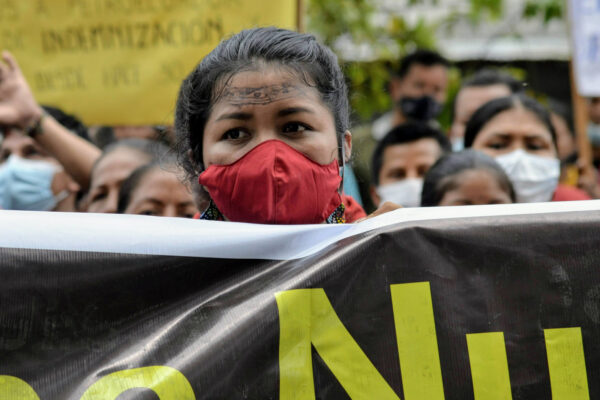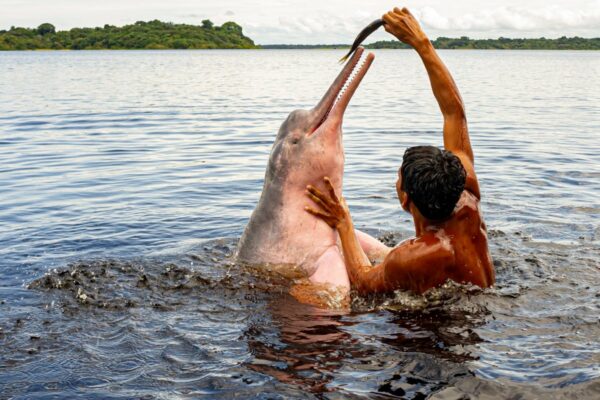Excerpts of an interview with Afandor Cobaría given to Luis Carlos Osorio, Director of the Colombia magazine Actualidad Étnica.* Available online at www.etniasdecolombia.org
Bogotá, July 6, 2007. Roberto Afanador Cobaría, as recognized on his official ID card, is probably the most emblematic indigenous person of the U’wa indigenous people of Colombia. Through him, the whole world came to know the problems of this community as they confronted a large transnational corporation: Occidental Petroleum. His words traveled to the most prestigious universities of the United States and Europe. His voice rang loud in the European Parliament and his denunciations even reached the demilitarized zone of San Vicente del Caguan, an area created by former Colombian President Pastrana to carry out conversations with the FARC (Revolutionary Armed Forces of Colombia). This new stage of the conflict over petroleum in this indigenous territory, now with the Colombian state oil company, ECOPETROL, has not been impervious to the absence of this great leader. “Where is Berito Cobaría?” asks a chorus of voices who are becoming involved with this process. In this interview granted to the Director of the magazine Actualidad Étnica, many of these questions are answered.
THE NEGOTIATION IS WITH THE FATHER CREATOR, SIRA.
“Sira is the father creator of the world, not any other saint; he is the guardian of our mother earth that in our language is called ‘kajka-ika’. She, our earth is the only gold that was given to us, because from her we gather our crops for our own consumption, without the intention of converting our earth and the products that we receive from her into business. Because the creator said that if at some moment someone violates the integrity of the mother earth for selfish economic benefit, he will punish that person…”
“When the earth was created, oaths to Sira were made. For this reason at the present time we continue holding ceremonies where we conjure Sira’s name each time we enter a territory given that this is a law that he created…”
“Today, the U’wa have problems with the petroleum companies because they do not have authorization to utilized the territory. For this reason we always tell them that they must negotiate with Sira and not with us, because the law says clearly: ‘If you violate, I will punish, If you contradict, I will punish.’ These punishments are cast through natural phenomena like earthquakes, hurricanes, floods or darkness. It is the only law. To the question of how we can find this law, he [Afandor Cobaría] responds with vehemence: “This law I have here (in my heart), this is called institutionality, and the cassette I have here in my head.”
FROM GENERATION TO GENERATION
Among the U’wa, the law is transmitted from generation to generation. “When an authority is seated, in ceremony, conjuring and singing, in these moments is when this law is transmitted to the other generations, because it is the moment when all the entities of nature are convoked. This is the way that we acquire and interpret knowledge. These traditions are like our education, our university and our form of interacting that law with our creator.” The U’wa pay tribute to water, but more to mother earth. Berito adds, in almost a ceremonial fashion: “without earth there is no light, without earth there is no ground,” for this reason the earth is the space that we study all knowledge that our traditions offer. The earth is our central core.”
Berito reorganizes his thoughts and summarizes the policies different Colombian presidents have utilized with the indigenous people: “The only thing they are after is economic compensation, to take it to the World Bank in Washington.” All of them have sold out our interests, except for Rojas Pinilla, “who fulfilled the decree left by Simon Bolivar who we call “Sigacuba.” He adds: “Simon Bolivar must be understood in Spanish and in our language also…laws in Spanish and in our language must be understood, not knowing the laws in this manner, (Colombia President) Uribe is utilizing the earth for economic benefit and is violating the laws of the creator.”
THE RESERVE IS TO PRESERVE…
In terms of the dilemma over ancestral territory and the reserve, Berito’s arguments show his old wisdom: “This reserve has a very important significance from a constitutional and historical point of view, such that the word “resguardo” (the Spanish word for ‘reserve’) means to guard or respect.” For this reason, Mother Earth and Father Creator made an agreement to guard their children in these lands. Nonetheless, when Christopher Columbus arrived, what he did was to take and divide the riches that were in the territory, in addition to demarcating and drawing up land titles for the territories of the indigenous Colombians. After this, the Father Creator said: “Another rule and another historian will be born.” Who was born? Simon Bolivar.
“Therefore, the U’wa idea is to demand respect for these titles to our lands that were signed during colonial times in order to have legal property rights over them. That is what we are working for and the government has not wanted to cede on this topic.”
BLACK GOLD AND VIOLENCE
For black gold, there is always much violence, states Roberto. “We have other gold — our body — which we call red gold that comes from our hearts. This red gold is the same color as animals. For this reason, we protect the U’wa territory, where there is much of this gold throughout the five departments that our people cover so that so that the root of our gold, the earth, water, our property, is not destroyed or disrespected.”
Specifically because of the contamination that the petroleum companies cause in indigenous territory, we vehemently oppose their presence, given that behind contamination comes violence. For Roberto Cobaría, “Chavez [President of Venezuela] and Uribe should analyze this situation together to avoid a borderlands conflict between ancestors because Chavez presides over the territory of our ancestors.” Although Chavez also extracts petroleum from indigenous lands, the U’wa want to understand more profoundly Chavez’s thinking, the way he respects, or fails to respect the rights of indigenous communities. For this reason the U’wa hope to meet with him in Caracas, in San Cristobal “or where ever we’re sent…”
He sings a song in his native tongue, emulating the manner in which the U’wa protect their territory, how they communicate with their ancestors. He stops singing and adds: “Our bilingual authorities are those that are charged with understanding state institutions, for this reason, we do not accept that they come and manipulate us, speaking in English. No, for this reason we have the central tribal council as well as the presidency of the ONIC (National Indigenous Organization of Colombia) at the national level, to clarify with the institutions and carry out good relations.
WHAT IS TO COME IN THE NEW PHASE OF THE CONFLICT?
We are going to protest against the North Americans of the World Bank. I, Roberto Cobaria, personally want to protest the World Bank in Washington. The U’wa of Cubara, Boyaca, want to completely dedicate ourselves to not allow the ratification of new regulations that are they want to develop.”
Roberto is conscious of his relevance, his role as leader. He demands direct responses from the president Alvaro Uribe. He believes that the media has distorted the reality of this conflict, for this reason he says: “We hope and expect that the national media support this and do not make it invisible as they have other things that matter very little to them, such as RCN, Caracol, etc.” And he rests all his hopes in the decisions that will be taken by the U’wa people in their General Assembly.
* Translated from Spanish by Amazon Watch.













